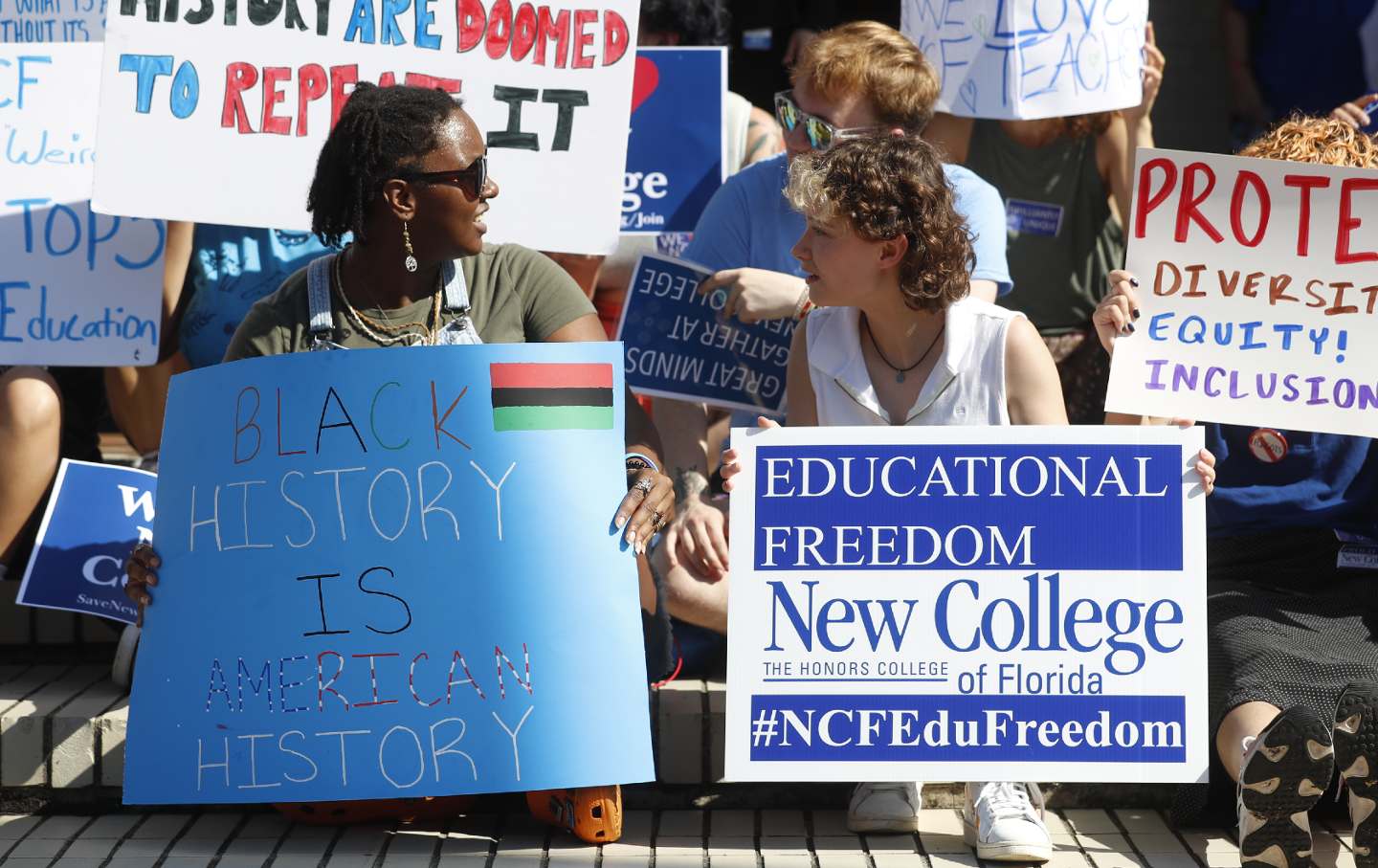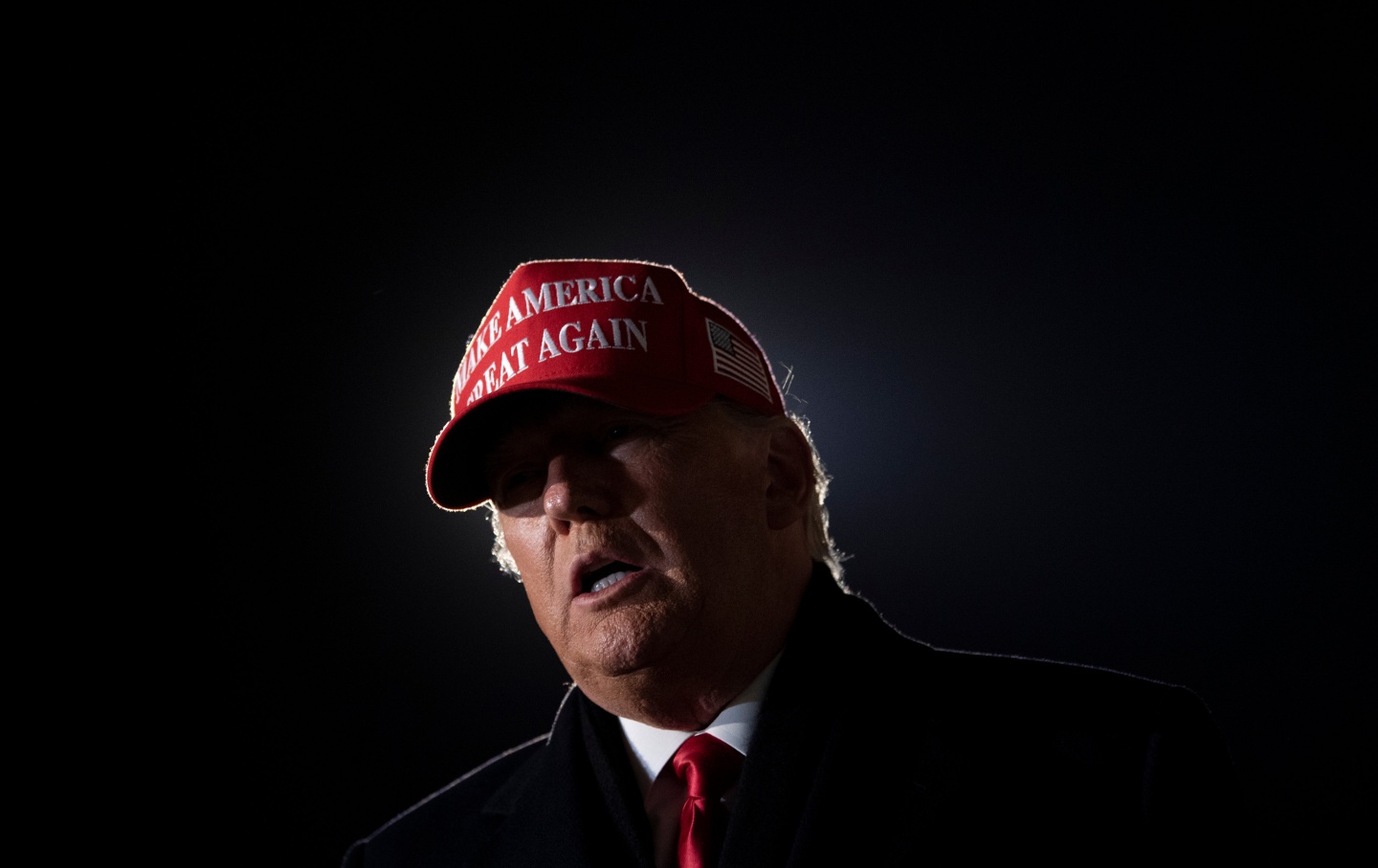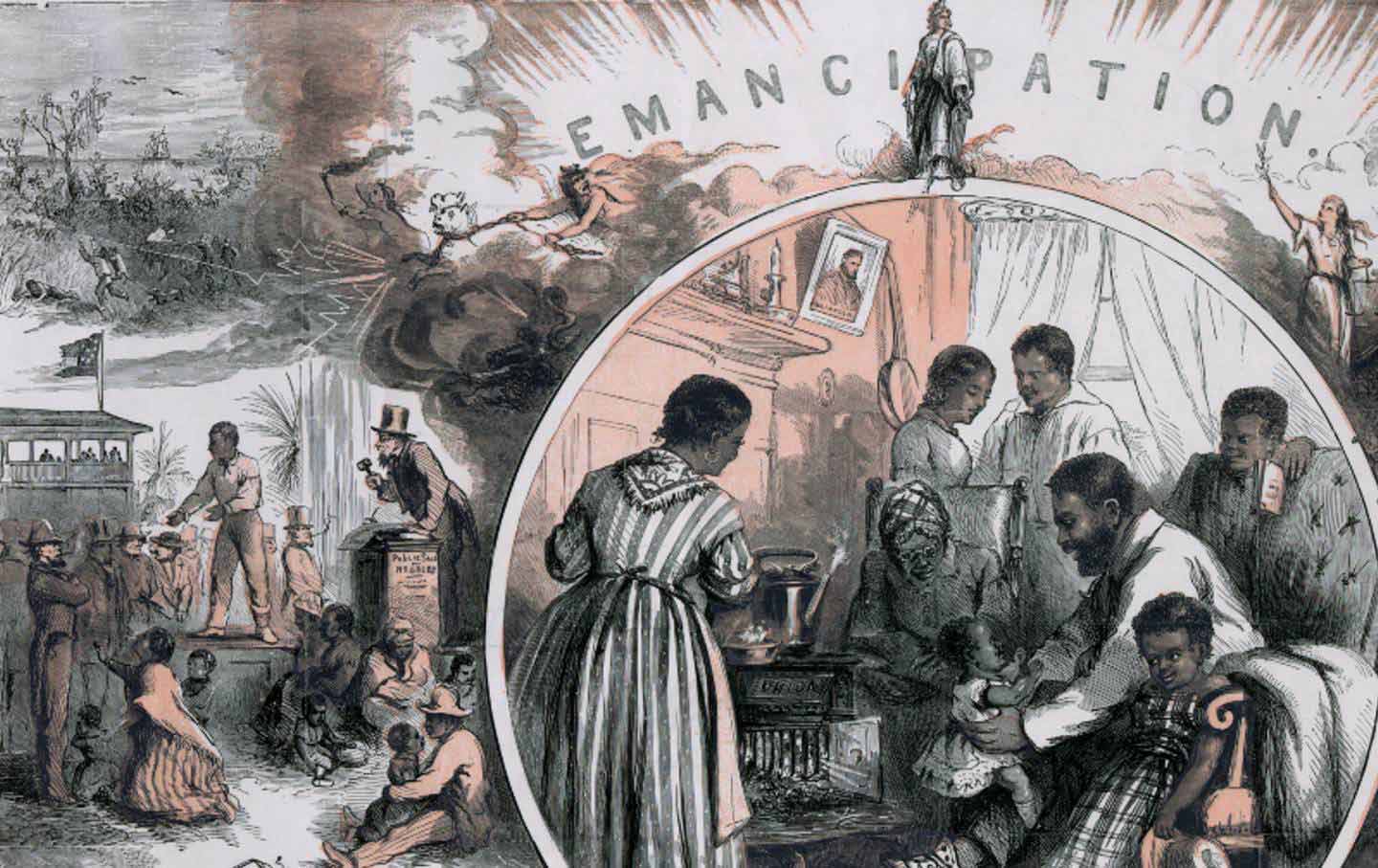Florida’s “War on Woke” Is Spurring a Brain Drain
Thanks to Ron DeSantis’s education policies, the state is seeing an unprecedented exodus of teachers, professors, and college students.

Lately, Florida Governor and Republican presidential candidate Ron DeSantis has significantly curtailed his use of the term “woke.” Whereas just a few months ago he said the word seven times in 26 seconds in a speech, he avoided it completely during the first primary debate.
DeSantis’s rhetorical retreat is likely due to recent polling showing that his once-declared “war on woke” is yielding diminishing electoral returns. But anyone hoping that this political shift would be accompanied by a policy shift will be disappointed. His authoritarian, white supremacist attacks on Florida’s public education system have continued apace.
DeSantis has enacted multiple “educational gag orders” that criminalize classroom discussions of race, gender identity, and ugly historical realities that might make white students “feel guilt, anguish, or any other form of psychological distress.” Florida teachers, whose salaries rank 48th in the country, have seen their jobs become only more thankless. The end result is an exodus of teachers, and what Florida Education Association (FEA) head Andrew Spar has called “one of the worst teacher and staff shortages” in the state’s history. “The policies, vilification, and low pay are certainly all factors,” Spar told me. “I was shocked, going around the state and talking to teachers as we were starting the school year, hearing over and over again, ‘I’m getting out of education in general because, as much as I love working with and teaching kids, I’m really not able to do that. I just want to be able to teach.’”
Spar’s anecdotal experiences are borne out by statistics. In January 2019, when DeSantis was sworn into his first term as governor, there were 2,217 teacher vacancies in the state’s K-12 public schools. As he entered his second term in January 2023, that number had ballooned to 5,294, according to the FEA. This August, the FEA found the number of unfilled positions neared a staggering 7,000.
DeSantis’s education policies not only ban free speech in the classroom but encourage increased curriculum surveillance through what PEN America calls “educational intimidation bills” that empower DeSantis’s conservative allies to monitor and punish educators who step out of line. For example, HB 1467, signed by DeSantis in 2022, requires that every public elementary school’s website provide “a list of all materials maintained in the school library” and invites not just parents, but any “resident of the county,” to file an objection. While the law neglects to mention specific penalties, it makes passing reference to Florida statute 847.012, a preexisting law classifying the dissemination of sexually obscene material to minors as a felony. The confusion has led at least one county to err on the side of caution by restricting in-class discussions of Shakespeare—Shakespeare!—to excerpts that steer clear of racy sexual content.
“Teachers don’t know what to say, or what not to say, and so they’re opting to not say anything, not only because of fear of getting fired but of potentially getting arrested and being charged if they happen to violate this law,” Nikki Fried, chair of the Florida Democratic Party, told me.
In the realm of higher education, DeSantis’s takeover of the state university system’s honors college, New College, has seen him install six political cronies to its board of trustees, among them right-wing provocateur Christopher Rufo. The partisan board fired the college’s president, appointed a DeSantis ally in her place, voted to end the gender studies program, signaled the sunsetting of tenure, and aggressively recruited male students to undo what right-wingers call the “feminization” of American colleges. The board takeover also drove 40 percent of the faculty to quit and a slew of classes to be canceled just days before the school year started.
“DeSantis isn’t choosing people who are qualified to be presidents of universities and colleges—he’s putting in people for the sole purpose of changing the philosophies of the teaching,” Fried told me. “We have multiple high-ranking leadership positions open at the University of Florida, and I don’t know who they’re going to fill them with—because if you care about academia, you’re not coming to the University of Florida right now.”
It’s not just educators who are recoiling. This March, an Intelligent.com survey found that 91 percent of college-bound Florida high school students “disagree with DeSantis’s policies,” along with 79 percent of currently enrolled college students in the state. Nearly 13 percent of graduating high school seniors cited DeSantis’s “education policies” as the reason they won’t attend a Florida state college. Among those who plan to enroll in a Florida state school, 78 percent are concerned that DeSantis’s “policies will have a negative impact on their education.” And one out of 20 state college students said they “plan to transfer because of DeSantis’ education policies.” As of early August, at least two dozen of New College’s 700 students had taken up Massachusetts-based Hampshire College on its offer to accept any New College defectors at the same tuition.
DeSantis has shrugged off any suggestions of an impending educational brain drain. Of the New College faculty departures, he said, “If you’re a professor in, like, you know, Marxist studies, that’s not a loss for Florida.” After signing a bill that defunded diversity programs in the state’s colleges, he suggested that students who disagree should “go to Berkeley.” And at the first Republican primary debate, the self-proclaimed “Education Governor” suggested he’d take the war on public schools national, stating, “We need education in this country, not indoctrination in this country.”
“Ron DeSantis is undermining all the work that was done in these last 20 years to make Florida a destination for education,” Fried told me. “He’ll be gone by the time that there’s real repercussions to his actions. But they will have a ripple impact on higher education in Florida for generations to come.”
We cannot back down
We now confront a second Trump presidency.
There’s not a moment to lose. We must harness our fears, our grief, and yes, our anger, to resist the dangerous policies Donald Trump will unleash on our country. We rededicate ourselves to our role as journalists and writers of principle and conscience.
Today, we also steel ourselves for the fight ahead. It will demand a fearless spirit, an informed mind, wise analysis, and humane resistance. We face the enactment of Project 2025, a far-right supreme court, political authoritarianism, increasing inequality and record homelessness, a looming climate crisis, and conflicts abroad. The Nation will expose and propose, nurture investigative reporting, and stand together as a community to keep hope and possibility alive. The Nation’s work will continue—as it has in good and not-so-good times—to develop alternative ideas and visions, to deepen our mission of truth-telling and deep reporting, and to further solidarity in a nation divided.
Armed with a remarkable 160 years of bold, independent journalism, our mandate today remains the same as when abolitionists first founded The Nation—to uphold the principles of democracy and freedom, serve as a beacon through the darkest days of resistance, and to envision and struggle for a brighter future.
The day is dark, the forces arrayed are tenacious, but as the late Nation editorial board member Toni Morrison wrote “No! This is precisely the time when artists go to work. There is no time for despair, no place for self-pity, no need for silence, no room for fear. We speak, we write, we do language. That is how civilizations heal.”
I urge you to stand with The Nation and donate today.
Onwards,
Katrina vanden Heuvel
Editorial Director and Publisher, The Nation








